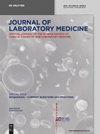Antibody titer 6 months after the third dose of COVID-19 mRNA vaccination
IF 1.1
4区 医学
Q4 MEDICAL LABORATORY TECHNOLOGY
引用次数: 1
Abstract
Abstract Objectives Administration of the third dose of severe acute respiratory syndrome coronavirus-2 (SARS-CoV-2) vaccine was initiated on December 1, 2021, in Japan. However, data on the long-term effects of this third vaccination remain scarce. Here, we examined the levels of SARS-CoV-2 antibodies in those who received the Pfizer BioNTech (BNT162b2) vaccine, 6 months after the third vaccination. Methods Samples from 40 healthy volunteers were used to measure SARS-CoV-2 antibodies with chemiluminescent assays against the receptor-binding domain (RBD) of the virus. Results At 445 days after the first dose of BNT162b2, which is 180 days after the third vaccination, the mean anti-RBD IgG level was 159.4 AU/mL (SD 100.1 AU/mL), which was significantly higher than 144 days after the second vaccination, while mean anti-RBD IgM was baseline level (0.4 C.O.I.). The decline in IgG, 180 days after the third vaccination, was 74.1% (SD 16.1%), which was significantly lower than the 88.6% (SD 4.4%) decline observed 144 days after the second vaccination. Furthermore, we revealed that the reduction in IgG from 14 to 180 days after the third vaccination showed a significant inverse correlation with age, and the higher antibody response in younger participants at 14 days after the third vaccination disappeared at longer time points. Conclusions The long-term durability of the IgG titer was significantly higher following the third vaccination compared with the second vaccination, and the reduction in IgG titer after the third vaccination inversely correlated with age.第三次接种COVID-19 mRNA后6个月的抗体滴度
目的2021年12月1日,日本开始接种第三剂严重急性呼吸综合征冠状病毒-2 (SARS-CoV-2)疫苗。然而,关于第三次疫苗接种的长期效果的数据仍然很少。在这里,我们检测了接受辉瑞BioNTech (BNT162b2)疫苗的患者在第三次接种疫苗6个月后的SARS-CoV-2抗体水平。方法采用化学发光法检测40例健康志愿者的SARS-CoV-2病毒受体结合域(RBD)抗体。结果在第一次接种BNT162b2后445天,即第三次接种后180天,抗rbd IgG平均水平为159.4 AU/mL (SD 100.1 AU/mL),显著高于第二次接种后144天,而抗rbd IgM平均水平为基线水平(0.4 C.O.I.)。第三次接种后180 d, IgG下降74.1% (SD 16.1%),显著低于第二次接种后144 d的88.6% (SD 4.4%)。此外,我们发现第三次疫苗接种后14至180天IgG的减少与年龄呈显著的负相关,并且第三次疫苗接种后14天年轻参与者的较高抗体应答在更长的时间点上消失。结论第三次接种后IgG滴度的长期持久性明显高于第二次接种后,且第三次接种后IgG滴度的降低与年龄呈负相关。
本文章由计算机程序翻译,如有差异,请以英文原文为准。
求助全文
约1分钟内获得全文
求助全文
来源期刊

Journal of Laboratory Medicine
Mathematics-Discrete Mathematics and Combinatorics
CiteScore
2.50
自引率
0.00%
发文量
39
审稿时长
10 weeks
期刊介绍:
The Journal of Laboratory Medicine (JLM) is a bi-monthly published journal that reports on the latest developments in laboratory medicine. Particular focus is placed on the diagnostic aspects of the clinical laboratory, although technical, regulatory, and educational topics are equally covered. The Journal specializes in the publication of high-standard, competent and timely review articles on clinical, methodological and pathogenic aspects of modern laboratory diagnostics. These reviews are critically reviewed by expert reviewers and JLM’s Associate Editors who are specialists in the various subdisciplines of laboratory medicine. In addition, JLM publishes original research articles, case reports, point/counterpoint articles and letters to the editor, all of which are peer reviewed by at least two experts in the field.
 求助内容:
求助内容: 应助结果提醒方式:
应助结果提醒方式:


